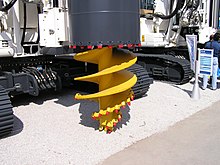Geotechnical engineering
| Subject classification: this is an engineering resource. |
Geotechnical engineering is an important subset of civil engineering dealing with engineering performance of earth materials. Geotechnical engineering uses the principles of soil and rock mechanics to determine:

- subsurface conditions and materials;
- relevant physical/mechanical and chemical properties of these materials;
- stability of natural slopes and man-made soil deposits;
- risks posed by site conditions;
which should be used in a process of design of:
- earthworks;
- structure foundations;
and in monitoring of:
- site conditions;
- earthwork and foundation construction.[1][2]
Foundations built for above-ground structures include shallow and deep foundations. Retaining structures include earth-filled dams and retaining walls.
Wikimedia Commons has media related to Geotechnical engineering.
References
edit- ↑ Terzaghi, K., Peck, R.B. and Mesri, G. (1996), Soil Mechanics in Engineering Practice 3rd Ed., John Wiley & Sons, Inc. ISBN 0-471-08658-4
- ↑ Holtz, R. and Kovacs, W. (1981), An Introduction to Geotechnical Engineering, Prentice-Hall, Inc. ISBN 0-13-484394-0